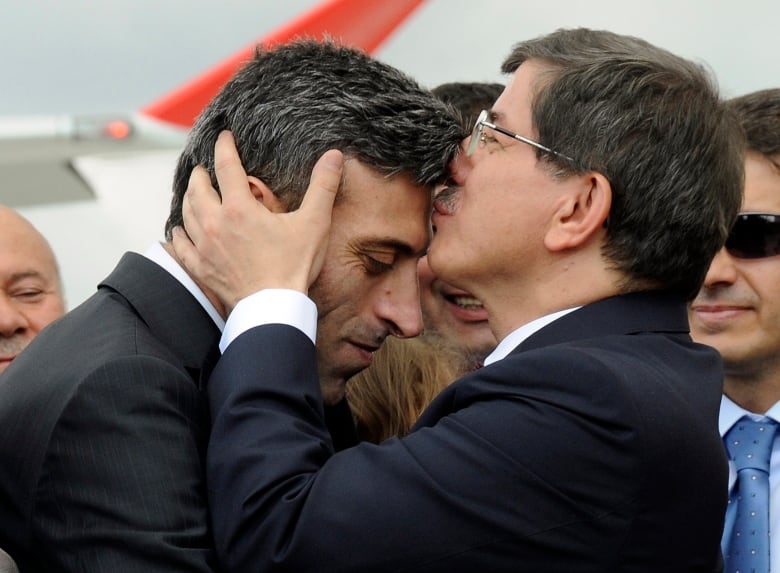Why Turkey is reluctant to join U.S-led coalition against ISIS
'It's obviously very careful' in how it handles Islamic State militants, analyst says

The launch of airstrikes in Syria by a U.S.-led coalition as part of the fight against the Islamic State in Iraq and Syria has placed Turkey in a delicate position of needing to thwart the militant group's growing threat while not wanting to raise its ire and face retribution.
"It`s obviously very careful on how it handles ISIS," said Didem Ackyel Collinsworth, the International Crisis Group's senior analyst for Turkey. "In terms of signing on to the coalition and taking part in airstrikes and so on, [it] would be very cautious about that."
On Tuesday, Turkish President Recep Tayyip Erdogan said he was considering expanding support for Western and Arab operations against the Islamic State group to include everything, "both military and political."
The remarks signalled a possible shift by Erdogan, who has so far not committed to a U.S.-led coalition to take on the militants.
"Nations like Turkey have their own clear, vested personal interest in confronting the threat that's posed by ISIL," White House spokesman Josh Earnest said recently, referring to the Islamic State by one of its many acronyms. "All of the mayhem and havoc that ISIL is wreaking in Iraq and in Syria is right on Turkey's doorstep. And it's certainly not in their interest for all that instability and violence to be occurring so close to their border."
- Barack Obama says airstrikes against ISIS in Syria not just America's fight
- ISIS advance in Syria sparks 'refugee wave' in Turkey
- ANALYSIS: Is ISIS violence expanding worldwide?
- Turkey says 49 hostages seized by ISIS have been freed
While the instability and violence may not be in Turkey's interest, neither is being seen by ISIS as playing a significant role in the coalition's mission, which is why Turkey has been reluctant to join.
'Cannot allow itself to be a launchpad'
"Turkey also understands that it cannot allow itself to be a launchpad for an international effort against the Islamic State, the outcome of which is extremely uncertain," wrote Kamran Bokhari, adviser for Middle Eastern and South Asian affairs for the geopolitical intelligence firm Stratfor.
"Turkey is all too aware of how Pakistan even today, nearly two generations after it agreed to serve as the staging ground for the U.S.-led effort to counter Soviet military intervention in Afghanistan, continues to deal with the fallout of that war, which has not yet ended."

The pressure for Turkey to play a more active role comes after it was able to secure the release of 49 hostages from ISIS, who held the prisoners for more than 100 days after they were captured from the Turkish consulate in the northern Iraqi city of Mosul.
The reasons for the hostages' release remain unknown; Turkey has said little. Whether it was through ransom, prisoner exchange or some other means, the transfer did signify that, unlike the U.S and Britain, Turkey does have some contact with the group, at least through intermediaries.
One potential conduit is former Iraqi vice-president Tariq al-Hashimi, who took refuge in Turkey, and who may have ties to ISIS, said Henri Barkey, professor of international relations at Lehigh University in Pennsylvania.
"I don't know this for a fact, but it makes sense. I would say that for sure they had interlocutors," Barkey said.
While Turkey may have some indirect contacts with the militant group, it's unlikely those relationships can help mediate the current conflict with the U.S. And with the hostage crisis now ended, the U.S. has been applying pressure on Turkey to commit to the U.S.-led coalition against ISIS.
Worried about terrorist activities
"It hadn't signed up for the coalition against ISIS because it cited these hostages," Collinsworth said in a phone interview from Istanbul. "The fact they have been freed, I don't see any changes in the underlying fundamental cause of its reluctance."
Much of that reluctance stems from Turkey's long and very porous borders and its fear of retaliation from ISIS.
"The points controlled by ISIS continually increase and it's a very valuable border for Turkey, which it admits it can't fully control so it's very worried about seeing terrorist activities in its cities," Collinsworth said.
Turkey is also constrained by the fact that its population is overwhelmingly Sunni and that Turks generally sympathize with Sunni Arabs as victims, she said.
There's no sympathy for ISIS, but should Turkey take a direct approach in action that results in dead Sunnis, "there's a very good possibility it may be turned into propaganda that the west is killing Sunnis again," Collinsworth said.
"ISIS does seek polarization and I think Turkey is vulnerable to that polarization should it get directly involved," she said.
Barkey, who recently wrote a piece for Foreign Policy titled How the Islamic State Took Turkey Hostage, said Turkey is also concerned about a squadron of Turkish soldiers that guards an ancient tomb south of Turkey's border with Syria, believed to belong to the first Ottoman sultan's grandfather.
"Now that area is completely controlled by ISIS," he said
This means that Ankara still faces "a second quasi-hostage crisis that gives Turkish leaders reason to think twice about joining Obama's coalition," Barkey wrote.
With files from The Associated Press